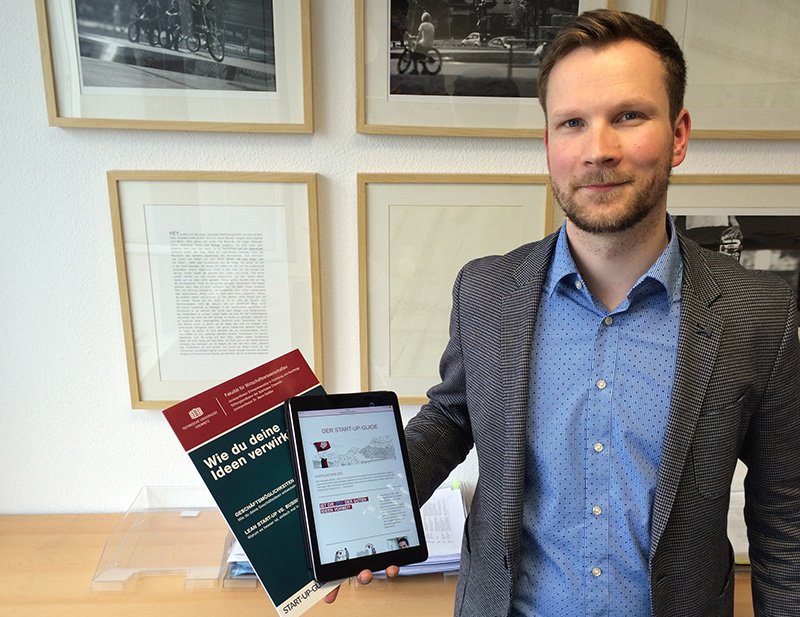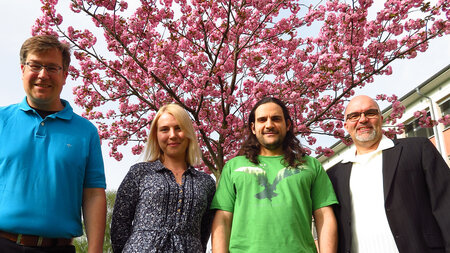Promotion and Implementation of Personal Ideas
Eleven questions for Jun.-Prof. Dr. Mario Geißler, who holds the Junior Professorship of Entrepreneurship in Business Creation and Succession Management since December 2013
-

"I want to give students the necessary tools at hand and to develop their own ideas, to test these and, if the circumstances match, to have these implemented" – With analog and digital start-up guide, Jun.-Prof. Dr. Mario Geißler gives insights into the opportunities and challenges in becoming entrepreneur. Photo: Philipp Munzert
Jun.-Prof. Dr. Mario Geißler (34) has held the Junior Professorship of Entrepreneurship in Business Creation and Succession Management, which is sponsored by the Sparkasse Chemnitz, at the Faculty of Economics and Business Administration since December 2013. In eleven responses he gives the readers of “University News“ an insight into his professional background, scientific objectives and activities in Chemnitz.
What is actually meant by “entrepreneurship” and who are “entrepreneurs”?
Entrepreneurship, in German translated as “Unternehmertum”, refers to innovative start-ups. Entrepreneurs are persons who discover, evaluate and implement new business opportunities. Often they scrutinize traditional and are not satisfied with existing. Entrepreneurship extends not only to the high-tech sector. Also in the social field, we may come across entrepreneurs, who solve the social problems sustainably through new approaches. In this case, one talks about social entrepreneurship.
The TU Chemnitz is the right choice for me as a junior professor, because…
... one has a lot of development opportunities here. Especially when it comes to the issue of entrepreneurship, there are many opportunities for cooperation and joint project work for me at the TU Chemnitz. In the last term, I have offered a joint workshop with the Professorship of Textile Technologies, which filled us all with enthusiasm and moved us step forward. Likewise, now start exciting projects with the founder network SAXEED at the Centre for Knowledge and Technology Transfer that help us bring students and academic staff closer with the foundation thoughts.
Can you say a few words about your academic career so far?
I studied Economics and Business Administration at the TU Chemnitz and then worked for the founder network SAXEED. Here I came in contact with many entrepreneurs. In parallel, I have been doing a doctorate on promoting business start-ups in the university environment. Before I received the call to the endowed junior professorship, I have developed an innovative additional qualification on the subject of corporate succession together with a small team and in close collaboration with numerous representatives of the industry and offered it for several terms at the TU Chemnitz.
Describe your years of study in only a few words.
In search of what I am really excited about and what I enjoy.
Did you have role models during your studies who encouraged you to pursue a scientific career?
Yes, there were especially some people, who showed me that scientific career can also mean a great fulfillment.
Do you have any advice for young students and graduates?
They should use the time to learn more about themselves: What can they develop their passion for, what comes easily, what fosters them, and what are their wide-ranging interests and abilities. This also means to look outside their own field of study, to be involved in associations and to gain insights from different perspectives. For me, this means: to be curious and open-minded, and bring along a certain degree of need for achievement.
What would you like to achieve in your teachings in the future?
Committed entrepreneurs can use their visions to initiate major changes in the economy and society. At all faculties of our institution, we find creative minds who question what already exists and have promising ideas. It fascinates me to hear the ideas of the students and think what great companies may result there from. At the same time, it makes me sad if I hear that really good ideas are not implemented and were not at least tested for their feasibility, or in case students claim of being uncreative. Therefore, I want to give the necessary tools at hand to develop their own ideas, to test these and, if the circumstances match, to have these ideas implemented by students. This should be not only in the high-tech sector, but may also relate to the fields of social or corporate entrepreneurship. Therefore, I like to support student clubs if they approach me with challenges.
What impact does your research have at the TU Chemnitz?
On the one hand, I work with the basics of founding process. For this purpose, one needs to understand what impels people to start their own business or what keeps them from it. This also includes the role of an environment that promotes entrepreneurship, like university among students, academic staff members and professors. With better understanding of this process, it is also possible to raise this issue even more on the agenda and to increase the willingness to own entrepreneurship. On the other hand, I want to help develop a better understanding about why some long-time business owners do not separate themselves from their businesses and push a corporate succession on the back burner. Strategically tackled, the generation change can expose a whole new potential within the company. This is of great economic importance when considering around 27,000 profitable companies that are faced with the handover in Germany. Different studies show that more than half of all entrepreneurs are seeking advice too late when dealing with their own succession, which limits the course and design options of the succession.
There are around 45,000 professors at German universities. What distinguishes you from all others?
I do not know whether I distinguish myself from others. Although I think many, who take this route, burn on a topic and want to give it a sustainable shape. That is how I feel about entrepreneurship, a deep understanding of this phenomenon and its fostering.
What is your favorite place to show guests in Chemnitz?
Here are many places that I like. I am happy to recommend the Kunstsammlungen at the Theaterplatz, the Industriemuseum and the Museum Gunzenhauser. Here you can have a good occasion to observe, which positive force entrepreneurs had and still have for the city of Chemnitz. For this purpose, I always give a small city guide with background information. For instance: What is with the hole next to the Roter Turm and why are these penguins standing at the entrance of the Klosterstrasse?
How do you play a part in the life of the city?
For a long time, my wife, my friends and I, have built up the Junge Kunstfreunde e.V. – a sub-association of the Kunstsammlungen Chemnitz. We have thus created a focal point for young people of Chemnitz interested in art, who want to talk with like-minded people and discover art in the city. One of the highlights has always been an annual party at the Museum Gunzenhauser or at the Kunstsammlungen. I have a 15-month-old son, who hogs me fully after work, which is why the time has become scarce for active engagement. Therefore, we have changed sides and now go to various events, without having to organize them.
Further information about the professorship at: https://www.tu-chemnitz.de/wirtschaft/egn/startseite/
(Translation: Nataliia Boiko)
Katharina Thehos
30.09.2015





